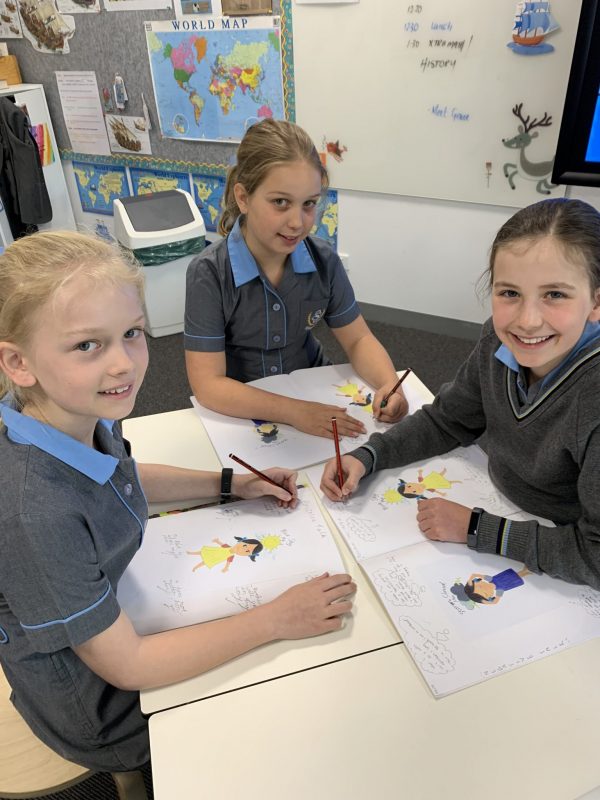Girls and Self-Belief

I recently came across some disturbing statistics on girls published by the Heart of Leadership, and although the statistics refer to American girls, we know that Australia has a reputation for following in their footsteps. So perhaps we can heed this as a warning and take steps to ensure this is not the case of our girls.
The following information was taken from their website.
Pressure and Perfectionism
- 74 per cent of girls say they are under pressure to please everyone (Girls Inc, The Supergirl Dilemma).
- 98 per cent of girls feel there is an immense pressure from external sources to look a certain way (National Report on Self Esteem).
- 90 per cent of eating disorders are found in girls (National Association for Self Esteem).
- 92 per cent of teen girls would like to change something about the way they look, with body weight ranking the highest (Dove Campaign).
- One in four girls today fall into a clinical diagnosis – depression, eating disorders and other mental/emotional disorders. On top of these, many report being constantly anxious, sleep deprived and under significant pressure (The Triple Bind, Steven Hinshaw).
- By age 13, 53 per cent of American girls are ‘unhappy with their bodies’. This grows to 78 per cent by the time they reach 17 (National Institute on Media and the Family).
To understand and counteract the issues above, I have found the following:
The Need to Please Everyone and Anxiety
JoAnn Deak, PhD, author and psychologist, writes about what she calls ‘The Tyranny of Niceness’. She believes that females have a neurological reason to please and care for others and this is tied to the survival of the species. She warns that this can go too far, especially during adolescence. During this time, they often fulfil their need to belong and care through their friends and can become too dependent on them, lose their own sense of self and beliefs, and what she describes as ‘less study’. To counteract this, she encourages girls to expand their focus of care and broaden it to include other things such as sports, pets, getting involved in interests or pet shelters to fulfil the need. “When they have other things to care about, it decreases the need to please.”

JoAnn Deak, PhD, author and psychologist, encourages girls to expand their focus to include other things such as sports to fulfil the need to please.
Importance of Body Image and Eating Disorders
Abi Wright, CEO and Co-Founder of Festival of the Girl, said: “The eight to twelve year-old age range for girls is a pivotal stage of their development, with many of their adolescent issues starting and the transition from primary to secondary school.” She contributes much of this pressure with the growth of social media. This is supported by Renee Hobbs, EdD, Associate Professor of Communications at Temple University, who states that “the average teen receives approximately 180 minutes of media exposure daily and only about 10 minutes of parental interaction daily.”
She suggests that parents should encourage girls to look critically about the unrealistic way that the media portrays girls and body image. She believes this can be done by parents spending time co-viewing TV and the internet and talking about what they see. It is during these times that parents can learn how their daughters perceive celebrities and use the time to talk about how media and special effects help celebrities achieve their looks.
She recommended girls accessing the site My Pop Studio which enables girls to create their own celebrity image. These images are often very different from reality and provide parents with the opportunity to talk about how unrealistic these images are and that special effects such as airbrushing are used to create the final image. This can be quite powerful and help girls to feel better about the way they look, flaws and all.
To help prevent eating disorders, talking to your daughter about eating habits and body image is a good place to start. The Mayo Clinic recommends the following key topics for discussion:
- Encourage healthy eating habits and how these affect health, appearance and energy levels.
- Media messages are often portraying one body type, so it is important to talk to them and encourage them to question what they have seen and heard.
- Healthy body images need to be promoted and girls need to be reassured that healthy body shapes vary.
- Outlining the dangers of dieting and emotional eating and how these can lead to health issues and more serious eating disorders over time.
Girls who are well informed are less likely to be influenced by media, peer groups or influencers.
Ms Karen McArdle, Head of Junior School
References:
- https://heartofleadership.org/statistics/
- https://www.kidsinthehouse.com/all-parents/family-life/gender-differences/girls-and-need-please-everyone
Year 4 Wellbeing Program
Each week, the Year 4 students participate in a targeted Wellbeing Program. The curriculum is based on the emotional wellbeing program entitled ‘Aristotle’ developed by the Swinburne University Emotional Intelligence Department and is designed specifically for students in Year 4. Emotional literacy is very relevant to the school context, and its positive influence on personal development and academic achievement is well known. The program presents to the students a range of activities that endeavour to develop their skills relating to emotions and the processing of emotional information.
The Year 4 students have had the opportunity to explore emotions through art, picture books, story writing and drama.
Through the introduction of ‘Blue Sky Me’ and ‘Storm Cloud Me’, the students have developed strategies to understand and manage negative and positive self-talk. It has been wonderful to see the girls enjoy the engaging activities and begin to apply the skills learnt to social situations.
Here are some of the students’ comments about their involvement in the program:
In Wellbeing this year, we have been doing the Aristotle program. It is mostly about emotions and when you feel them. We have done a lot of activities including exploring ‘Blue Sky Me’. She is about what you should be thinking, rather than ‘Storm Cloud Me’ who thinks badly about herself. If I am feeling sad I can use the positive self-talk to help me feel better. – Fleur Angenent 4S.
In Year 4 Wellbeing, we have been doing the Aristotle program. It helps you explain your emotions and to know other people’s emotions. We do activities like writing down what paintings make us feel, emoji feelings, ‘Storm Cloud Me’, ‘Blue Sky Me’, bucket fillers and road sign emotions. These are all about voicing our emotions. – Clara Calvert 4S.
I thought that Wellbeing helped me bring out my feelings for things. I learnt how there are words for big feelings, little feelings and also happy and sad ones too. – Olivia Grasso 4T.
-

Charlotte Bell, Fleur Angenent and Adelaide Lempriere.
-

Louisa Liao, Chloe Handbury and Clara Calvert.
-

Scarlett Stevenson Kotsos and Isabelle Potter.



